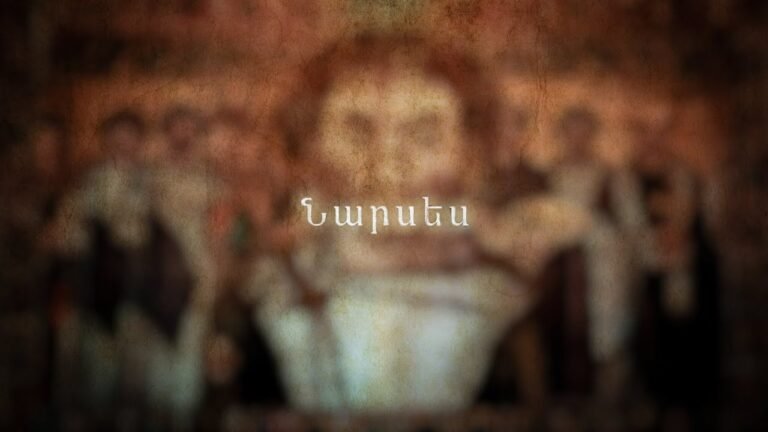Music arranged by Farya Faraji, vocals by Farya Faraji. Please keep in mind that this isn’t reconstructed Byzantine music, only modern music with a thematic idea of the Byzantine empire. Narses, along with Belisarius, was one of the great generals of Justinian and Theodora’s era, fighting for the reconquest of the Italian peninsula along with many other battles. An Armenian, he was born in a region known as Persarmenia, then under the control of the Sasanian Empire, and he himself was from the Kamsarakan family, linked genealogically to the House of Karen, one of the seven great noble houses of the Parthians. Agathias Scholasticus says of him “He was a man of sound mind, and clever at adapting himself to the times. He was not versed in literature nor practiced in oratory, but made up for it by the fertility of his wits,” and as “small and of a lean habit, but stronger and more high-spirited than would have been believed.” Narses entered the court of Justinian and rose through the ranks. At one point, Justinian changed a law which barred eunuchs from accessing the high position of patrician, just so that Narses, himself a eunuch, could become a patrician. From there, Narses would serve Justinian as one of his greatest generals amassing many victories, the most important ones being in Italy. After the reconquest, he would oversee renovation projects in Italy as well as the city of Rome, and importantly, he was the last general of Roman history to ever receive an official triumph within the city of Rome itself. A strongly religious man, he held a specific devotion to the Virgin Mary, and supposedly never went into battle without her consent.
This is a composition I based around folk melodic motifs from the region of the Armenian highlands in eastern Anatolia played on the duduk, an Armenian instrument commonly found in Armenian, Kurdish and Turkish music of the region. I wanted to capture the essence of Armenian music from the Armenian highlands, and therefore used the duduk, an instrument that I generally can’t stand in most soundtracks and “epic style music.” The duduk represents for me the apex of the West’s disinterest with understanding the music of the East: any time a film in the West is set in the Middle-East or in some ancient era like Rome or Greece, it’ll automatically use the duduk, because after the film Gladiator, the duduk has cemented itself into Western minds as “that ancient/eastern” sounding instrument. There’s loads of videos with millions of views on YouTube called “ancient Egyptian music,” that use the duduk, an Armenian instrument from the Caucasus and Eastern Anatolia, because as far as pop-culture is concerned, it’s such some vague Eastern sounding instrument and all Eastern music is the same anyway–it would be like having Italian mandolins in a song about Vikings because “whatever they’re both in Europe it’s all the same music anyway.” Supposedly Arabic themed music set in Morocco will use the duduk if the music is written by Westerners.
Soundtracks about ancient Rome also have an automatic fixation on the duduk, and Rome 2 Total War’s soundtrack for example utilises this Armenian instrument unrelated to Rome to represent the concept of the Roman Empire, because that strong association has cemented itself ever since Hans Zimmer’s use of the instrument in his soundtrack (one of my favourite soundtracks by the way, I’m not criticising his use, only the secondary effect it generated in pop culture). I want to stress that my use of the instrument here is a calculated one, and though you’ve probably heard it in hundreds of other epic music pieces with a historical theme, those tend to randomly use it in inappropriate contexts such as Iranian, Arabic or Indian-themed pieces, or even Roman, based on that general lack of knowledge of Eastern and ancient music and this general attitude of “whatever it sounds vaguely Eastern and ancient, good enough for me.” If you’re reading this, please keep in mind that the duduk is more than some vague instrument that can be applied randomly in every ancient and eastern context: it’s a specific instrument with Armenian roots, with a specific use geographically in Eastern Anatolia, the Southern Caucasus and parts of Northern Iran, deeply linked to Armenian music with presence in other neigbouring cultures of the area also. I added a saz, a Greek lauto, davul drums and an oud to the instrumentation, with all these instruments being found both in Greek and Armenian music except for the lauto, only found in Greece. The lyrics are a prayer to the Virgin Mary, since I wanted to reflect his strong devotion to her, with the form of Armenian found here being an archaic one. The pronunciation is the Iranian dialect.
English translation of the lyrics:
Hail Mary, full of grace,
the Lord is with thee.
Blessed art thou amongst women,
and blessed is the fruit of thy womb, Jesus.
Holy Mary, Mother of God,
pray for us sinners,
now and at the hour of our death. Amen.
source




30 Comments
ERRATUM: For some reason I pronounced the “h” in “orhneal” as a voiceless velar fricative instead of a voiceless glottal fricative, my bad.
Music arranged by Farya Faraji, vocals by Farya Faraji. Please keep in mind that this isn't reconstructed Byzantine music, only modern music with a thematic idea of the Byzantine empire. Please note this isn't reconstructed historical music, it's modern folk music. The Epic Byzantine Music series is a musical project where I explore various sounds from the ethnomusicological ecosystem of modern traditional music, using sounds from modern folk traditions as they are today as a framing device for themes pertaining to the history of the Eastern Roman Empire. Narses, along with Belisarius, was one of the great generals of Justinian and Theodora's era, fighting for the reconquest of the Italian peninsula along with many other battles. An Armenian, he was born in a region known as Persarmenia, then under the control of the Sasanian Empire, and he himself was from the Kamsarakan family, linked genealogically to the House of Karen, one of the seven great noble houses of the Parthians. Agathias Scholasticus says of him "He was a man of sound mind, and clever at adapting himself to the times. He was not versed in literature nor practiced in oratory, but made up for it by the fertility of his wits," and as "small and of a lean habit, but stronger and more high-spirited than would have been believed." Narses entered the court of Justinian and rose through the ranks. At one point, Justinian changed a law which barred eunuchs from accessing the high position of patrician, just so that Narses, himself a eunuch, could become a patrician. From there, Narses would serve Justinian as one of his greatest generals amassing many victories, the most important ones being in Italy. After the reconquest, he would oversee renovation projects in Italy as well as the city of Rome, and importantly, he was the last general of Roman history to ever receive an official triumph within the city of Rome itself. A strongly religious man, he held a specific devotion to the Virgin Mary, and supposedly never went into battle without her consent.
This is a composition I based around folk melodic motifs from the region of the Armenian highlands in eastern Anatolia played on the duduk, an Armenian instrument commonly found in Armenian, Kurdish and Turkish music of the region. I wanted to capture the essence of Armenian music from the Armenian highlands, and therefore used the duduk, an instrument that I generally can't stand in most soundtracks and "epic style music." The duduk represents for me the apex of the West's disinterest with understanding the music of the East: any time a film in the West is set in the Middle-East or in some ancient era like Rome or Greece, it'll automatically use the duduk, because after the film Gladiator, the duduk has cemented itself into Western minds as "that ancient/eastern" sounding instrument. There's loads of videos with millions of views on YouTube called "ancient Egyptian music," that use the duduk, an Armenian instrument from the Caucasus and Eastern Anatolia, because as far as pop-culture is concerned, it's such some vague Eastern sounding instrument and all Eastern music is the same anyway–it would be like having Italian mandolins in a song about Vikings because "whatever they're both in Europe it's all the same music anyway." Supposedly Arabic themed music set in Morocco will use the duduk for example.
Soundtracks about ancient Rome also have an automatic fixation on the duduk, and Rome 2 Total War's soundtrack for example utilises this Armenian instrument unrelated to Rome to represent the concept of the Roman Empire, because that strong association has cemented itself ever since Hans Zimmer's use of the instrument in his soundtrack (one of my favourite soundtracks by the way, I'm not criticising his use, only the secondary effect it generated in pop culture). I want to stress that my use of the instrument here is a calculated one, and though you've probably heard it in hundreds of other epic music pieces with a historical theme, those tend to randomly use it in inappropriate contexts such as Iranian, Arabic or Indian-themed pieces, or even Roman, based on that general lack of knowledge of Eastern and ancient music and this general attitude of "whatever it sounds vaguely Eastern and ancient, good enough for me." If you're reading this, please keep in mind that the duduk is more than some vague instrument that can be applied randomly in every ancient and eastern context: it's a specific instrument with Armenian roots, with a specific use geographically in Eastern Anatolia, the Southern Caucasus and parts of Northern Iran, deeply linked to Armenian music with presence in other neigbouring cultures of the area also. I added a saz, a Greek lauto, davul drums and an oud to the instrumentation, with all these instruments being found both in Greek and Armenian music except for the lauto, only found in Greece. The lyrics are a prayer to the Virgin Mary, since I wanted to reflect his strong devotion to her, with the form of Armenian found here being an archaic one. I used the pronunciation of Iranian Armenians as a basis so it might not reflect all pronunciations across the diaspora.
English translation of the lyrics:
Hail Mary, full of grace,
the Lord is with thee.
Blessed art thou amongst women,
and blessed is the fruit of thy womb, Jesus.
Holy Mary, Mother of God,
pray for us sinners,
now and at the hour of our death. Amen.
🍀🌿🇹🇷🍁☘️
Lots of Armenians in Uzbekistan here, and also a smaller one in Norway (where I live). But only now I heard about Narses.
Greetings from Czechia to all beautiful Armenians. Your heart is our heart, too.
Greeting from a Lithuanian Lipka Tatar to our Greek and Armenian pals.
God bless Armenians from a Brazilian.
As a Kazakh, Armenians have been faithful people to us, Kipchak Turks (don’t mix us with Oghuz pls) and we even coexisted for years.
💪💪💪💪💪💪💪🇦🇲🇦🇲🇦🇲🇦🇲🇦🇲 легендарнии Нерсес армяанин помним своих 🇦🇲🇦🇲🇦🇲🇦🇲🇦🇲👊👊👊👊👊👊👊👊👍👍👍👍👍
Thanks a lot! This song is beautiful❤🇦🇲🇦🇲🇦🇲
Doamne ajută fericire bucurie amin amin amin
From Vietnam with love!May Lord Jesus Christ bless all Christian my brother and sister around the world
Hmm I just had an idea, a bit of a contraversial one I know, but hear me out:
Narses the Armenian
Vs
Nasser the Azerbaijani
just to see who would win in that fight
Finally, a piece of music where the duduk is supposed to be
Oghjòyn kez Mariàm, li shnoròk,
Ter ënd kez
Ter ënd kez
Ter ënd kez
Orhneàl es du i kanàys,
ev orhneàl e ptùgh orokàyni koy, Ghìsus,
Sërbùhi Mariàm, mayr Astùdzoy,
barekhòsea vasn mer meghavoràts,
ayǰëm ev i zhamù mahvàn.
Plz music name Narek
Bı Kürt olarak çok beğendim
Храни тебя Бог кто сделал эту песню ❤
Я люблю тебя брат .
Мои христианские братья ,мы все должны объединится и помогать друг другу .
As a georgian if a wasn't georgian i would like to be greek armenian or italian
As a Hamshen from Türkiye,I'm so glad this song exists
Amen❤
I'M FATIH SULTAN MEHMET'S FAN I LISTENING TO BYZANTINE EMPIRE ARMENIAN SONG
This song reminded me of the church in the Armenian and Kurdish villages around Komagene and I understand most of the song, it almost sounds like Kurdish.
I'm belisarius fan listening to byzantine empire Armenian song
I'M FATIH SULTAN MEHMET'S FAN LISTEN TO BYZANTINE EMPIRE ARMENIAN SONG
Что за изображение / what is a picture
Can you please make more Christian Armenian songs?
This sounds exactly like Alevi Music called "Bugün Bize Pir Geldi" How did you turn this into an Armenian song?
尼西亞信經
我信唯一的天主,全能的聖父,天地萬物,無論有形無形,都是祂所創造的。
我信唯一的主、耶穌基督、天主的獨生子。祂在萬世之前,由聖父所生。祂是出自天主的天主,出自光明的光明,出自真天主的真天主。
祂是聖父所生,而非聖父所造,與聖父同性同體,萬物是藉著祂而造成的。
祂為了我們人類,並為了我們的得救,從天降下。祂因聖神,由童貞瑪利亞取得肉軀,而成為人。
祂在般雀比拉多執政時,為我們被釘在十字架上,受難而被埋葬。
祂正如聖經所載,第三日復活了。祂升了天,坐在聖父的右邊。
祂還要光榮地降來,審判生者死者。祂的神國萬世無疆。
我信聖神,祂是主及賦與生命者,由聖父聖子所共發。祂和聖父聖子,同受欽崇,同享光榮。祂曾藉先知們發言。
我信唯一、至聖、至公、從宗徒傳下來的教會。
我承認赦罪的聖洗,只有一個。
我期待死人的復活,及來世的生命。 阿们
Thank you Farya, really great composition and energy in the music.
Думает человек о Римской империи, а в ней армяне правят